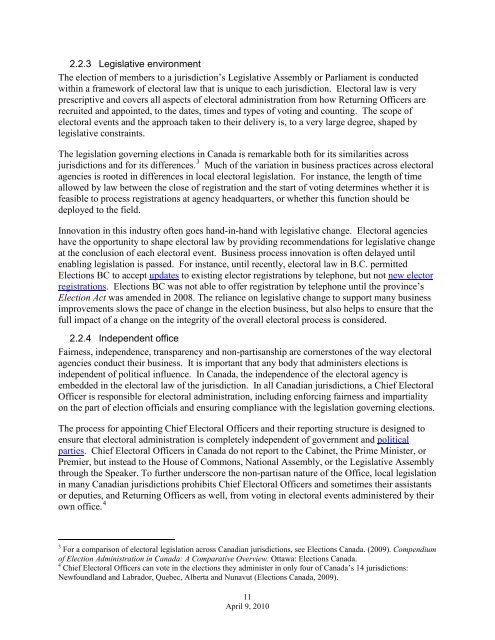Electoral-Management-Reference-Model-v.1.0
Electoral-Management-Reference-Model-v.1.0
Electoral-Management-Reference-Model-v.1.0
Create successful ePaper yourself
Turn your PDF publications into a flip-book with our unique Google optimized e-Paper software.
2.2.3 Legislative environment<br />
The election of members to a jurisdiction’s Legislative Assembly or Parliament is conducted<br />
within a framework of electoral law that is unique to each jurisdiction. <strong>Electoral</strong> law is very<br />
prescriptive and covers all aspects of electoral administration from how Returning Officers are<br />
recruited and appointed, to the dates, times and types of voting and counting. The scope of<br />
electoral events and the approach taken to their delivery is, to a very large degree, shaped by<br />
legislative constraints.<br />
The legislation governing elections in Canada is remarkable both for its similarities across<br />
jurisdictions and for its differences. 3<br />
Much of the variation in business practices across electoral<br />
agencies is rooted in differences in local electoral legislation. For instance, the length of time<br />
allowed by law between the close of registration and the start of voting determines whether it is<br />
feasible to process registrations at agency headquarters, or whether this function should be<br />
deployed to the field.<br />
Innovation in this industry often goes hand-in-hand with legislative change. <strong>Electoral</strong> agencies<br />
have the opportunity to shape electoral law by providing recommendations for legislative change<br />
at the conclusion of each electoral event. Business process innovation is often delayed until<br />
enabling legislation is passed. For instance, until recently, electoral law in B.C. permitted<br />
Elections BC to accept updates to existing elector registrations by telephone, but not new elector<br />
registrations. Elections BC was not able to offer registration by telephone until the province’s<br />
Election Act was amended in 2008. The reliance on legislative change to support many business<br />
improvements slows the pace of change in the election business, but also helps to ensure that the<br />
full impact of a change on the integrity of the overall electoral process is considered.<br />
2.2.4 Independent office<br />
Fairness, independence, transparency and non-partisanship are cornerstones of the way electoral<br />
agencies conduct their business. It is important that any body that administers elections is<br />
independent of political influence. In Canada, the independence of the electoral agency is<br />
embedded in the electoral law of the jurisdiction. In all Canadian jurisdictions, a Chief <strong>Electoral</strong><br />
Officer is responsible for electoral administration, including enforcing fairness and impartiality<br />
on the part of election officials and ensuring compliance with the legislation governing elections.<br />
The process for appointing Chief <strong>Electoral</strong> Officers and their reporting structure is designed to<br />
ensure that electoral administration is completely independent of government and political<br />
parties. Chief <strong>Electoral</strong> Officers in Canada do not report to the Cabinet, the Prime Minister, or<br />
Premier, but instead to the House of Commons, National Assembly, or the Legislative Assembly<br />
through the Speaker. To further underscore the non-partisan nature of the Office, local legislation<br />
in many Canadian jurisdictions prohibits Chief <strong>Electoral</strong> Officers and sometimes their assistants<br />
or deputies, and Returning Officers as well, from voting in electoral events administered by their<br />
own office. 4<br />
3 For a comparison of electoral legislation across Canadian jurisdictions, see Elections Canada. (2009). Compendium<br />
of Election Administration in Canada: A Comparative Overview. Ottawa: Elections Canada.<br />
4 Chief <strong>Electoral</strong> Officers can vote in the elections they administer in only four of Canada’s 14 jurisdictions:<br />
Newfoundland and Labrador, Quebec, Alberta and Nunavut (Elections Canada, 2009).<br />
11<br />
April 9, 2010


